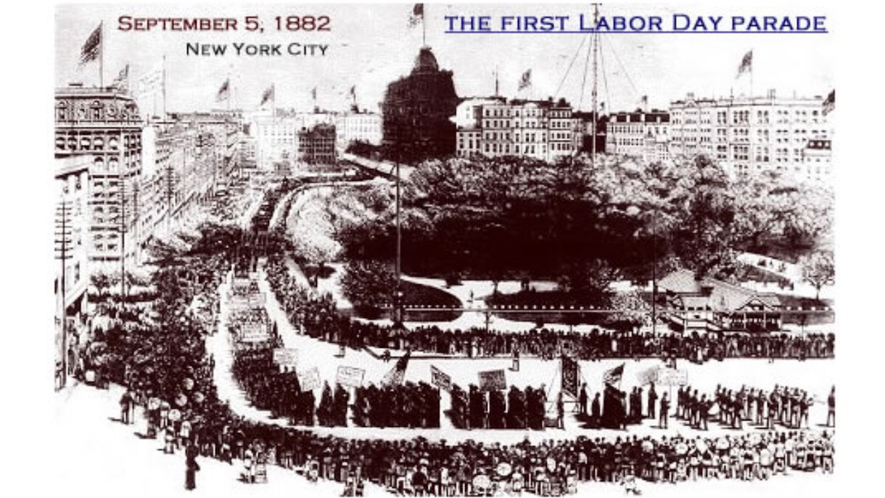Government & Economics
The History of Labor Day
Text Level 6
Word Count 736

Labor
Day is a U.S. national holiday. It is always held on the first Monday
of September. Unlike many other U.S. holidays, it is a celebration
without customs or traditions, except for maybe shopping and
barbecuing.
For
most people, Labor Day just marks the last weekend of summer and the
start of a new school year. Yet, the holiday’s founders in the late
1800s envisioned something very different. They wanted to have a day
that would bring workers together while giving them time off work.
History of Labor Day
The
first Labor Day holiday was in 1882 in New York City and was led by the
city’s Central Labor Union. A union is an organized group of workers
who have come together to protect their rights.
![The Solvay Process Company sometime before 1901, in Syracuse, USA. As more factories developed, so did the workers who found jobs there. They joined workers unions in order to get better working conditions. Photo: Library of Congress. [click to enlarge]](https://media.newsela.com/article_media/extra/loc-industrial-revolution-detroit-1901.jpg)
The
organizers of the first Labor Day wanted an event to bring different
types of workers together. However, employers did not recognize Labor
Day as a day off work. This was solved temporarily with a one-day strike
in the city. Workers left their jobs for the day to march in a parade
and then attend a giant picnic.
A newspaper article about the day said the event was like one long political barbecue with “rather dull speeches.”
Why was Labor Day invented?
Labor Day came about because workers felt they were spending too much time on the job.
In
the 1830s, manufacturing workers were putting in 70-hour weeks on
average. This is almost double what is considered full-time work today,
which is 40 hours a week. Many union organizers focused on securing an
eight-hour workday. Unions also wanted workers to have six working days a
week instead of seven.
Many
politicians and business owners were in favor of giving workers more
time off. That’s because workers who had no free time were not able to
spend their paychecks on traveling, entertainment or dining out.
The
U.S. economy was growing in the late 1800s and early 1900s. It was
important for businesses to sell more of their products and services.
Shortening the workweek was one way for the working class to spend its
money.
Common misconceptions
The
idea of a special holiday for workers was easy for politicians to
support. It was easy because it cost lawmakers nothing and helped them
seem likable to voters.
![A picture of U.S. President Grover Cleveland. Photo: Public Domain. [click to enlarge]](https://media.newsela.com/article_media/extra/wikim-president-grover-cleveland.jpg)
In
1887, Oregon, Colorado, Massachusetts, New York and New Jersey all
declared a day to celebrate workers. Soon, half the states in the
country recognized Labor Day as a holiday. By 1894, President Grover
Cleveland made Labor Day a national holiday.
However,
it is up to each state to declare its own holidays. An official
national holiday does not require employers to give their workers the
day off.
For
example, many stores are open on Labor Day. The same goes for some
government services, like police and transportation offices and national
parks.
As
president, Barack Obama encouraged Americans “to honor the
contributions and resilience of working Americans.” This did not
officially declare that anyone got time off, though.
Controversy: Militants and founders
Today most people do not think of Labor Day as a controversial holiday. This was not the case 100 years ago.
Some
union groups disagreed on how workers should act on a day designed to
honor workers. Certain unions supported a day of protests.
Other
union members wanted Labor Day to have parades and picnics. In the
U.S., picnics, rather than street protests, won the day.
There
is also a dispute over who suggested the idea of a Labor Day holiday.
It will likely never be known who actually came up with it.
Have we lost the spirit of Labor Day?
The
original holiday addressed a problem of long working hours and no time
off. This issue seems to be back for different types of workers, many of
whom are constantly connected to work.
Perhaps
stopping for one day could become a Labor Day tradition. Workers could
shut off phones, computers and other electronic devices and celebrate
having at least one day off from work during the year!
Jay L. Zagorsky is an economist and research scientist at Ohio State University.
This article is from Newsela.com.
Take a quiz about this article at https://newsela.com/read/lib-convo-labor-day-history/id/34269/quiz/0/